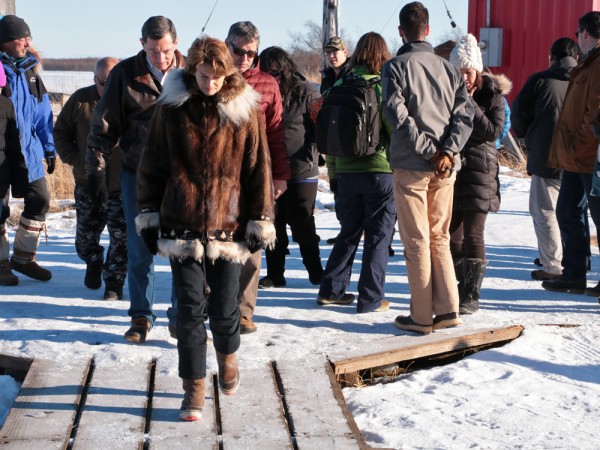Six U.S. senators and the U.S. Secretary of Energy traveled to Bethel Monday to hold a hearing on Alaska’s energy challenges and innovations. The team included the Senate Energy and Natural Resources Committee, lead by Republican Sen. Lisa Murkowski.
But before the hearing, the group went on a field trip to see where those challenges and innovations intersect.
The group, joined by Gov. Bill Walker and others, loaded in vehicles and drove five miles up the frozen Kuskokwim River to Oscarville, population 60.

Nearing the village, the first thing the group saw was a line of branches sticking out of the ice, and around them men are pike fishing. Then the group stepped inside the school. Elders greeted them, and students, wearing black and yellow kuspuks, danced and sang in Yup’ik. Later they performed Native games like the two-foot high kick and one-arm reach.
“I was almost crying earlier. Like really too happy. Everybody’s here, and I just stopped myself. I never really thought there’d be lots of senators, the governor, and secretary of energy would be here in Oscarville,” Michael Stevens, Oscarville tribal administrator, said.
He says he hopes the group’s visit jump-starts funding for basic necessitates like water, sewer, electricity, and housing. He says Oscarville uses rain and river water. Only the school has treated, running water. And all the residents use honeybuckets.
For over a year, a group of Alaska agencies have been trying to bring those services Stevens mentioned to the village. They’re using the community as a pilot project to develop these services together rather than individually.
One reason they chose Oscarville is because of the community’s strong local leaders and commitment to place. That is what the senators and secretary were seeing during their visit—in the subsistence pike fishing, the active elders, and Yup’ik dancing and games.
Jackie Schaeffer is helping facilitate the pilot project and tells her hopes for the visit.
“The goal would be for them to not only see the connection to place from the people and the culture but to see the challenges and how happy people are living here even with those challenges,” she said.
Whether or not the group left with that understanding, U.S. Secretary of Energy Earnest Moniz says the trip was better than a day in the office.
“You don’t get the same feel sitting in Washington [DC] and hearing this town doesn’t have water and we should do something,” he said.
If the pilot project succeeds, Oscarville won’t be without water for long. The agencies are looking into drilling a 400-foot community well.
Anna Rose MacArthur is a reporter at KYUK in Bethel.




